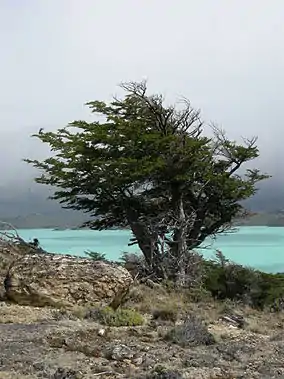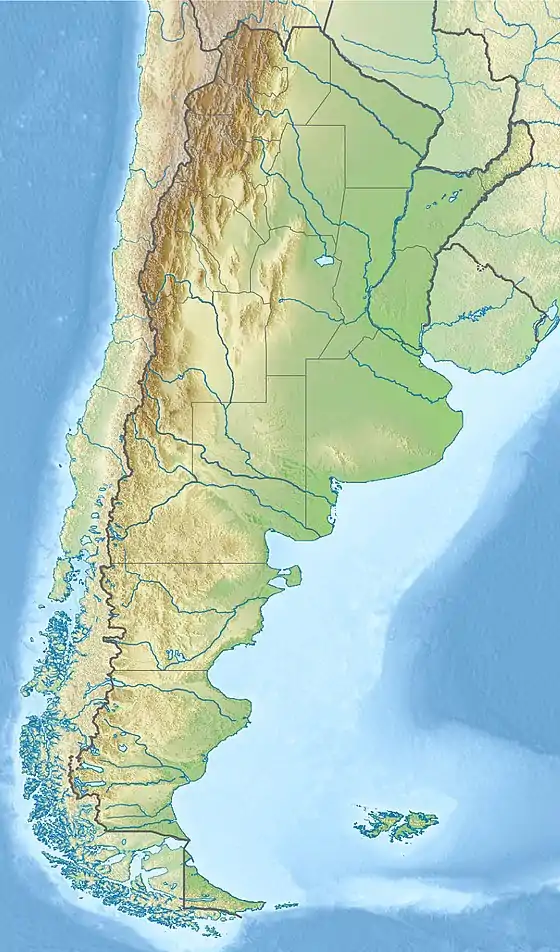Perito Moreno National Park
Perito Moreno National Park (Spanish: Parque Nacional Perito Moreno) is a national park in Argentina. It is located in the western region of Santa Cruz Province on the border with Chile. It has an area of 126,830 hectares of mountains and valleys at a height of 900 metres above sea level.
| Perito Moreno National Park | |
|---|---|
| Parque Nacional Perito Moreno | |
IUCN category II (national park) | |
 Hypochaeris incana, Belgrano peninsula, Perito Moreno National Park | |
 | |
| Location | Santa Cruz Province, Argentina |
| Coordinates | 47°48′41″S 72°15′02″W |
| Area | 126.830 hectares |
| Established | 1937 |
History
The park is one of the oldest in Argentina having been established in 1937. It is named in honour of the explorer Francisco Moreno.
Geography
Climate
The park has a cold climate ranging from a wet climate in the west to a dry one in the east.[1] The park experiences strong and persistent westerly winds throughout the year.[1] Mean annual rainfall ranges from 3,000 mm (120 in) in the west to 400 mm (16 in) in the east.[1] Temperatures can fall below −25 °C (−13.0 °F) in winter.[1] During summer, the mean temperature is around 15 °C (59.0 °F).[1] Snowfalls can occur in every month.[1]
Terrain
The park is located at around 900 metres above sea level, which is the height at which the valleys are inhabited. A series of mountain chains traverse the park from east to west and from north to south, resembling an imposing amphitheater. Inside the protected area the highest peak is cerro Heros (Heros hill) at 2,770 m. Nearby, but outside the boundary of the park lies the imposing cerro San Lorenzo (Monte San Lorenzo) which reaches 3,707 m in height,[2] which is generally covered by clouds. To the north of the lake Belgrano the cerro Leon (Lion hill) reaches 1,380 m and to the east of the same lake, the Gorra de Vasco (Basque peak) reaches 1,140 m. Inside the Park the Sierra Colorada (Red plain) is distinguished, of some 1,200 m, whose western slope is very abrupt, and whose coloring gives its name.
Hydrography
Two main basins are distinguished, one on the Pacific side and the other on the Atlantic. They comprise eight lakes including Belgrano Lake along with numerous rivers and streams.
The Pacific basin feeds into the lago Mogote (lake Mogote), which then flows into lago Volcán (lake Volcano).
The Atlantic basin features lago Burmeister (lake Burmeister) at 932 m. The many rivers in the basin traverse the Santa Cruz province and eventually reach the Atlantic to the east.
Flora and fauna
Of the 24 species of mammal that can be found in the park the most exotic and endangered species is the small wildcat gato pajero (Lynchailurus pajeros). Another small wildcat found within the park is the gato huiña (Oncifelis guigna) which is also endangered.
Other species include guanaco, puma (cougar), pategonian fox, dwarf armadillo, ferret, skunk, tuco-tuco and south andean deer.
One hundred and fifteen species of bird have been recorded in the park, including peregrine falcon, hooded grebe, flamingo, andean goose, Podiceps, and several species of ducks, falcons and eagles.
References
- "Parque Nacional Perito Moreno" (in Spanish). Administración de Parques Nacionales. Retrieved November 7, 2015.
- World Wildlife Fund; C. Michael Hogan. 2010. Magellanic subpolar forests. Encyclopedia of Earth, National Council for Science and the Environment. Washington DC
External links
| Wikimedia Commons has media related to Perito Moreno National Park. |
- Official website (in Spanish)